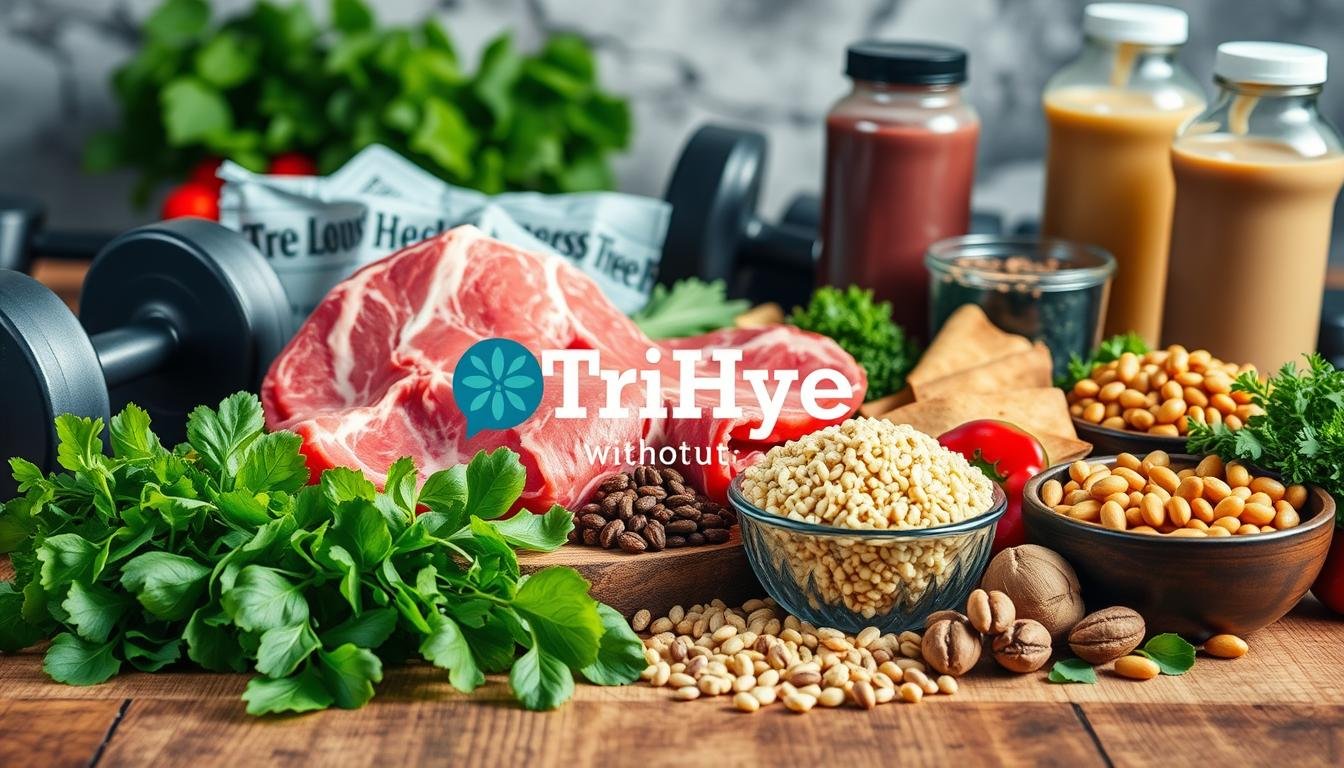I’ve spent hours in the gym, pushing my limits for muscle growth. But it’s not just about the time under the barbell. What you eat is crucial too. That’s why muscle nutrition is so important.
In this guide, we’ll cover the key parts of muscle nutrition for growth and performance. We’ll talk about protein, carbs, and fats. Plus, we’ll look at supplements and staying hydrated. By the end, you’ll know how to fuel your muscles for the best results.
Key Takeaways
- Proper muscle nutrition is crucial for building and maintaining lean muscle mass.
- Protein is the building block of muscles, and consuming enough high-quality protein is essential for muscle growth.
- Carbohydrates provide the energy needed for intense workouts, while healthy fats support muscle recovery and hormone production.
- Supplements like whey protein, creatine, and beta-alanine can be beneficial for enhancing muscle growth and performance.
- Staying hydrated and following a balanced, nutrient-dense meal plan is key for optimal muscle nutrition and overall health.
Understanding Muscle Nutrition
Muscle nutrition is key for any fitness plan. It deals with the nutrients and diet needed for muscle growth and recovery. Knowing about muscle nutrition helps us build and keep lean muscle, reaching our fitness goals.
What is Muscle Nutrition?
Muscle nutrition is about the nutrients and diet for muscle health and growth. It’s about the right mix of protein, carbs, and fats. Also, when and how much we eat these nutrients matters.
Why is Muscle Nutrition Important?
Muscle nutrition is important for many reasons:
- It gives us the parts for muscle growth and repair, helping us keep lean muscle.
- It fuels our workouts, giving us the energy and endurance to reach our fitness goals.
- It helps our muscles recover, reducing injury risk and letting us recover faster from hard workouts.
- It keeps our metabolism in check, which is key for body shape and weight control.
By focusing on muscle nutrition, we make sure our bodies get what they need to thrive. This is true whether we want to build muscle, stay lean, or just get healthier and fitter.

Protein: The Building Block of Muscles
Protein is key for muscle growth and repair. It’s made of amino acids, which are the building blocks of muscles. Getting enough protein is important for building muscles and keeping them healthy.
How Much Protein Do We Need?
The amount of protein needed for muscle building varies. It depends on age, activity level, and body type. Generally, people who work out should eat 1.6 to 2.2 grams of protein for every kilogram of body weight each day.
Best Sources of Protein
Choosing the right protein is as important as eating enough. Here are some top protein sources:
- Lean meats: Chicken, turkey, beef, and pork
- Fish and seafood: Salmon, tuna, tilapia, and shrimp
- Eggs and dairy: Whole eggs, Greek yogurt, and cottage cheese
- Plant-based options: Tofu, tempeh, lentils, and quinoa
| Protein Source | Protein Content (per 100g) |
|---|---|
| Chicken breast | 31g |
| Salmon | 25g |
| Eggs | 13g |
| Lentils | 9g |
| Whey protein powder | 24g |
Eating a variety of these protein sources helps your body get the amino acids it needs. This supports muscle growth and repair.

Muscle Nutrition: Fueling Muscle Growth
Proper muscle nutrition is key to building and keeping lean muscle. By timing your nutrients right, you help your body grow and repair muscles. This leads to more muscle over time.
To grow muscles, you need more calories than you burn. These extra calories help build new muscle fibers. Focus on getting these calories from good sources like proteins, complex carbs, and healthy fats.
When you eat is just as important as what you eat. Eating protein before and after working out gives your muscles what they need to repair and grow. After working out, carbs help refill your energy stores for the next workout and aid in muscle recovery.
Adding these nutrition tips to your workout routine can help you reach your muscle growth, lean mass, and bodybuilding goals.
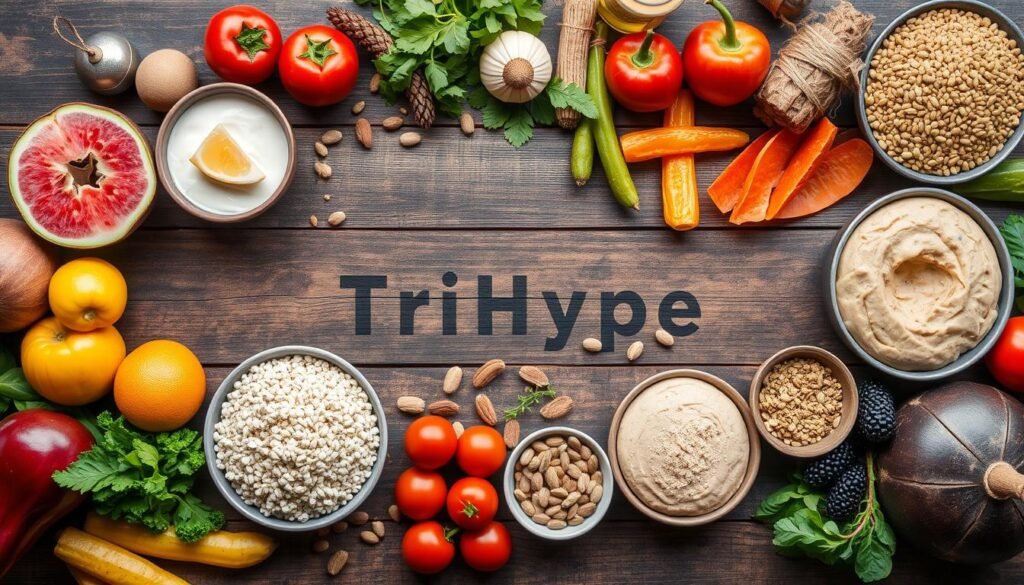
Carbohydrates: Energizing Your Workouts
Carbohydrates are key for our workouts. They give us the energy to keep going and help our muscles recover. Knowing how to use carbs can boost our fitness nutrition.
Types of Carbohydrates
There are many types of carbs, each with its own benefits. Simple carbs, like sugars, give quick energy. Complex carbs, like starches and fiber, offer energy over time. Knowing this helps us choose the right carbs for our diet.
Timing Your Carb Intake
When we eat carbs matters a lot. Before working out, we should eat complex carbs for steady energy. During, simple carbs like sports drinks help keep our energy up. After, a mix of carbs helps our muscles recover and rebuild energy.
| Timing | Carbohydrate Type | Benefits |
|---|---|---|
| Pre-Workout | Complex Carbohydrates | Sustained Energy Release |
| During Workout | Simple Carbohydrates | Glycogen Replenishment |
| Post-Workout | Complex + Simple Carbohydrates | Muscle Recovery and Glycogen Resynthesis |
By knowing how carbs work in our fitness nutrition and when to eat them, we can get the most out of them. This helps us perform better in our workouts and reach our carbohydrates goals.
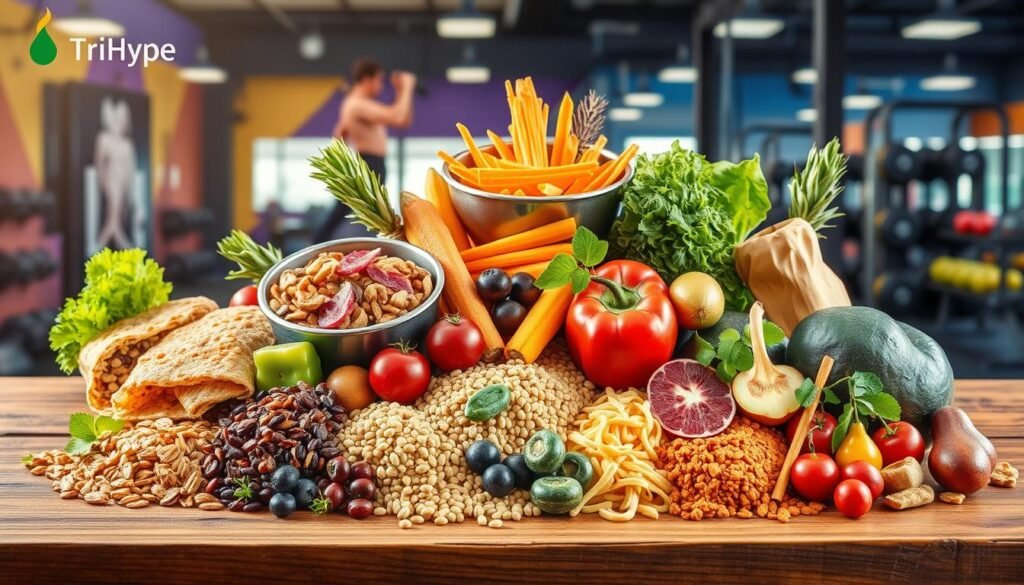
“Carbohydrates are the body’s preferred source of energy, and they play a crucial role in fueling our workouts and supporting muscle recovery.”
Healthy Fats: Supporting Muscle Recovery
Healthy fats are key for muscle nutrition and recovery. They include omega-3s and monounsaturated fats. These fats help your muscles and overall health.
Omega-3s are in fatty fish, walnuts, and flaxseeds. They fight inflammation. After hard workouts, muscles get damaged and inflamed. Omega-3s help fix this, speeding up recovery and growth.
Monounsaturated fats are in avocados, olive oil, and nuts. They help with hormone balance, which is vital for muscle repair. They also help your body use protein better, aiding in muscle building.
To nourish your muscles, eat a variety of healthy fats. Add fatty fish like salmon or tuna to your meals. Use healthy oils like olive or avocado oil in cooking. Nuts and seeds are also great for extra fats.
| Healthy Fat | Key Benefits for Muscle Recovery |
|---|---|
| Omega-3 Fatty Acids | Anti-inflammatory properties, reducing muscle inflammation and promoting faster recovery |
| Monounsaturated Fats | Regulate hormone production, enhance protein utilization, and support muscle growth |
Adding healthy fats to your diet helps with muscle recovery. It’s a step towards reaching your fitness goals.
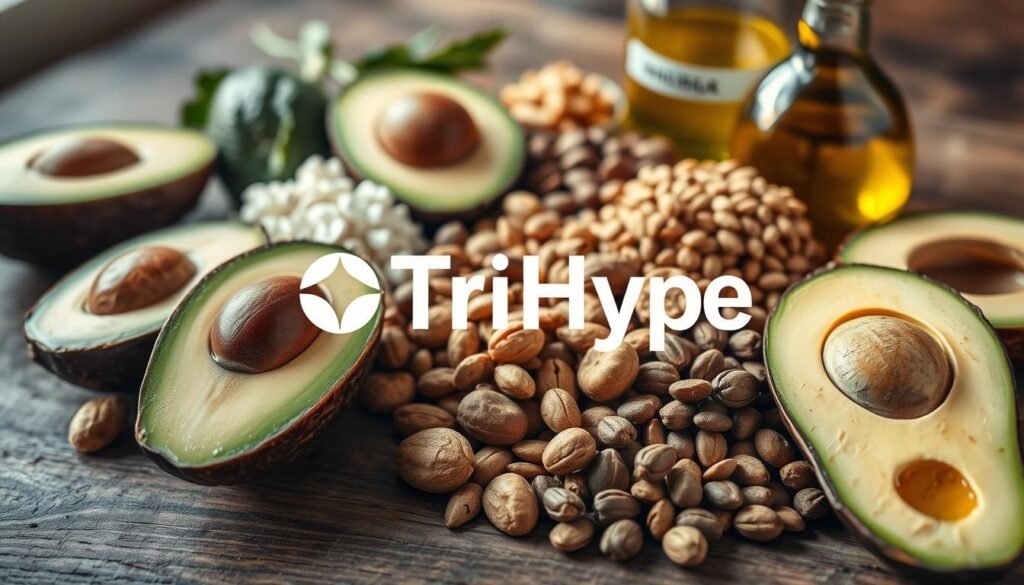
Hydration: Keeping Your Muscles Primed
Drinking enough water is key for muscle health and recovery. Not drinking enough can harm how well we move and feel. Knowing when we’re dehydrated and drinking enough water helps our muscles stay strong and ready to go.
Signs of Dehydration
It’s important to spot dehydration early to avoid its bad effects. Look out for these signs:
- Dry mouth and lips
- Headache or dizziness
- Decreased urine output or dark yellow urine
- Muscle cramps or fatigue
- Increased heart rate and body temperature
How Much Water Do We Need?
The amount of water we should drink daily changes based on several things. These include our age, gender, how active we are, and where we live. The National Academies of Sciences, Engineering, suggest the following:
- Men: About 15.5 cups (3.7 liters) a day
- Women: About 11.5 cups (2.7 liters) a day
These numbers include water from drinks and food. People who are more active might need to drink more water to replace lost fluids.
By drinking enough water all day, we help our muscles recover, grow, and perform well.
Supplements: Enhancing Muscle Growth
While a balanced diet is key, certain supplements can help your muscle-building efforts. We’ll look at whey protein supplements and other popular options.
Whey Protein Supplements
Whey protein is a fast-absorbing protein that supports muscle growth. It has all the amino acids your muscles need. Adding a good whey protein supplement to your diet can increase your protein intake and help your muscles grow.
Other Muscle-Building Supplements
There are other supplements that can help with muscle growth and strength:
- Creatine – This can boost muscle creatine stores, improving high-intensity workouts and muscle growth.
- BCAAs – These amino acids are key for muscle repair and recovery.
- Beta-alanine – It increases muscle carnosine, helping with exercise endurance and reducing muscle fatigue.
Remember, supplements are a boost, not a replacement for a healthy diet. Always talk to a healthcare professional before starting any new supplements.
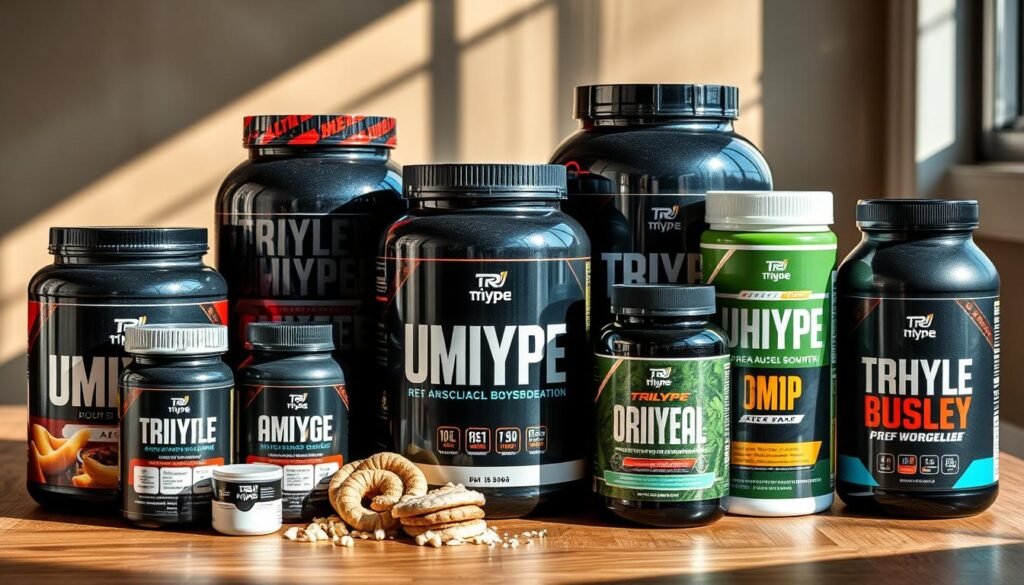
| Supplement | Key Benefits | Potential Risks |
|---|---|---|
| Whey Protein | Supports muscle growth and recovery | Possible digestive issues, allergies |
| Creatine | Enhances exercise performance, increases muscle size | Potential for dehydration, kidney issues |
| BCAAs | Promotes muscle protein synthesis, reduces fatigue | Possible interaction with medications |
| Beta-alanine | Improves exercise capacity, delays muscle fatigue | Potential for skin tingling, flushing |
“Supplements can provide a helpful boost, but they should not replace a well-rounded, nutrient-dense diet.”
Pre-Workout and Post-Workout Nutrition
Getting your pre-workout and post-workout nutrition right can really boost your muscle growth and recovery. What you eat before and after working out can greatly affect how well you perform and reach your fitness goals.
Let’s explore why pre-workout and post-workout nutrition are key. We’ll also look at ways to fuel your body for the best results.
Pre-Workout Nutrition: Fueling Your Muscles
Before hitting the gym, it’s vital to fuel up with the right pre-workout foods. These should give you energy, endurance, and help your muscles work better. Here’s what to include in your pre-workout snack or meal:
- Complex carbohydrates: These give you steady energy during your workout.
- Lean proteins: Proteins help keep and fix your muscles, so you can perform better.
- Healthy fats: Fats are important for hormones and overall health, adding to your pre-workout nutrition.
Post-Workout Nutrition: Refueling and Recovering
After a tough workout, your muscles need to recover and repair. It’s important to give them the right post-workout nutrients to help with this. Here’s what to add to your post-workout routine:
- High-quality proteins: Choose fast-absorbing proteins like whey or casein to start building muscle.
- Simple carbohydrates: These quick carbs help refill your energy stores and glycogen levels.
- Hydration: Drinking water or electrolyte-rich drinks helps rehydrate and supports your body’s functions.
By planning your pre-workout and post-workout meals carefully, you can get the most out of your workouts. This will help you grow muscle and recover better over time.
Meal Planning for Muscle Gain
Planning your meal planning is key for muscle growth. It doesn’t matter if you’re a pro bodybuilder or just starting out. A good meal plan can really help you reach your fitness goals.
Sample Muscle-Building Meal Plan
We’ve created a sample muscle-building meal plan for you. It’s all about the right mix of protein, carbs, and healthy fats. This mix supports muscle growth and keeps you healthy.
| Meal | Food Items | Macronutrients |
|---|---|---|
| Breakfast |
|
Protein: 30g, Carbs: 45g, Fats: 10g |
| Snack |
|
Protein: 25g, Carbs: 15g, Fats: 5g |
| Lunch |
|
Protein: 40g, Carbs: 35g, Fats: 10g |
| Snack |
|
Protein: 7g, Carbs: 20g, Fats: 12g |
| Dinner |
|
Protein: 35g, Carbs: 30g, Fats: 15g |
This muscle-building meal plan is a good starting point. It’s all about fueling your muscle growth and health. Remember, everyone is different. So, adjust the plan to fit your needs and preferences.
Nutrition for Cutting and Lean Muscle Maintenance
As fitness enthusiasts, we know muscle growth is key. But sometimes, we focus on cutting body fat or keeping lean muscle. We’ll look at nutrition for these goals.
For cutting, we need to eat fewer calories but still give our muscles what they need. This balance is crucial for fitness nutrition.
Macronutrient Adjustments for Cutting
To lose fat and keep lean muscle, we adjust our macronutrients:
- Eat 0.7-1 gram of protein per pound of body weight to help with cutting and keep muscle.
- Lower carbs to lose calories, but keep enough for workouts and recovery.
- Keep healthy fats moderate to support hormones and health.
Meal Timing and Nutrient Timing
Timing our food is key during cutting. We might try:
- Eat a high-protein meal or shake before and after workouts to save muscle.
- Have carb-rich meals around workouts for energy and recovery.
- Eat meals throughout the day to keep blood sugar stable and metabolism up.
Mastering fitness nutrition in cutting lets us lose fat while keeping lean muscle. The goal is to find the right balance and adjust as needed for our physique goals.
Overcoming Nutritional Challenges
Keeping up with a muscle-building diet can be tough, especially with busy lives or dietary limits. We’ll share tips and strategies to help you beat common nutrition obstacles and reach your fitness goals.
Busy Schedules and Meal Prep
Time is often the biggest hurdle to a muscle-building diet. Work, family, and other duties can leave little time for healthy meals. But, meal prep can change the game. Spending a few hours each week on meal planning and prep ensures you always have healthy options, even when you’re rushed.
- Set aside time each week to plan your meals and create a grocery list.
- Batch cook staple ingredients like grilled chicken, roasted vegetables, and brown rice.
- Invest in reusable meal prep containers to make it easy to grab and go.
- Explore quick and easy recipes that can be prepared in advance.
Dietary Restrictions and Allergies
Dealing with dietary restrictions or food allergies makes muscle-building nutrition even harder. But, with some creativity and planning, you can still meet your fitness goals while following your dietary needs.
- Identify your dietary restrictions or allergies and research alternative protein sources, complex carbohydrates, and healthy fats that align with your needs.
- Experiment with new recipes and ingredient substitutions to create delicious, nutrient-dense meals.
- Communicate with your healthcare provider or a registered dietitian to ensure you’re meeting your nutritional requirements.
- Be mindful when dining out or attending social events, and don’t be afraid to ask about ingredient lists or preparation methods.
By embracing meal prep and finding creative solutions for your dietary needs, you can overcome common nutritional challenges and stay on track with your muscle-building journey.
Tracking and Adjusting Your Nutrition
It’s key to keep an eye on your muscle nutrition plan for ongoing success. Watching your macronutrient intake, calorie balance, and diet patterns helps you stay on track. This way, you can make smart choices to boost your muscle-building efforts.
The Power of Nutrition Tracking
Keeping a nutrition log can offer deep insights into your eating habits. By jotting down what you eat, you learn about your protein, carbs, and fat intake. This knowledge lets you spot diet areas to improve and tweak your meals accordingly.
Tracking Tools and Techniques
- Use mobile apps or online trackers to log your daily food and monitor your macronutrients and calories.
- Keep a food journal, either written or digital, to record your meals and snacks.
- Use a food scale or measuring cups to accurately track your nutrient and calorie intake.
Adjusting Your Nutrition Plan
As you track your nutrition, you might need to tweak your diet for muscle growth. This could mean adjusting your macronutrient ratios, calorie intake, or meal timing. Consult with a nutritionist or fitness expert to craft a diet plan tailored to your needs and goals.
| Nutrition Tracking Metrics | Optimal Ranges for Muscle Growth |
|---|---|
| Protein Intake | 1.6-2.2 grams per kilogram of body weight |
| Carbohydrate Intake | 3-5 grams per kilogram of body weight |
| Fat Intake | 0.5-1.5 grams per kilogram of body weight |
| Calorie Surplus | 300-500 calories above maintenance level |
By tracking your nutrition closely and adjusting as needed, you can make sure your diet supports muscle growth. This will help you keep making progress in your fitness journey.
Effective Cardio Exercises for Better Fitness
Conclusion
Mastering muscle nutrition is key to boosting your muscle-building and fitness journey. By following the tips in this guide, you’ll be ready to reach your muscle growth and performance goals.
Eating a balanced diet with plenty of protein, complex carbs, and healthy fats is crucial. It fuels your workouts, helps with muscle recovery, and boosts muscle growth. Adding proper hydration and supplements can also enhance your fitness nutrition and improve your fitness level.
Consistency and tailoring your nutrition plan are important. Keep track of your progress, make changes as needed, and listen to your body. With hard work and a deep understanding of muscle nutrition, you’ll get closer to your fitness goals and unlock your full muscle potential.
